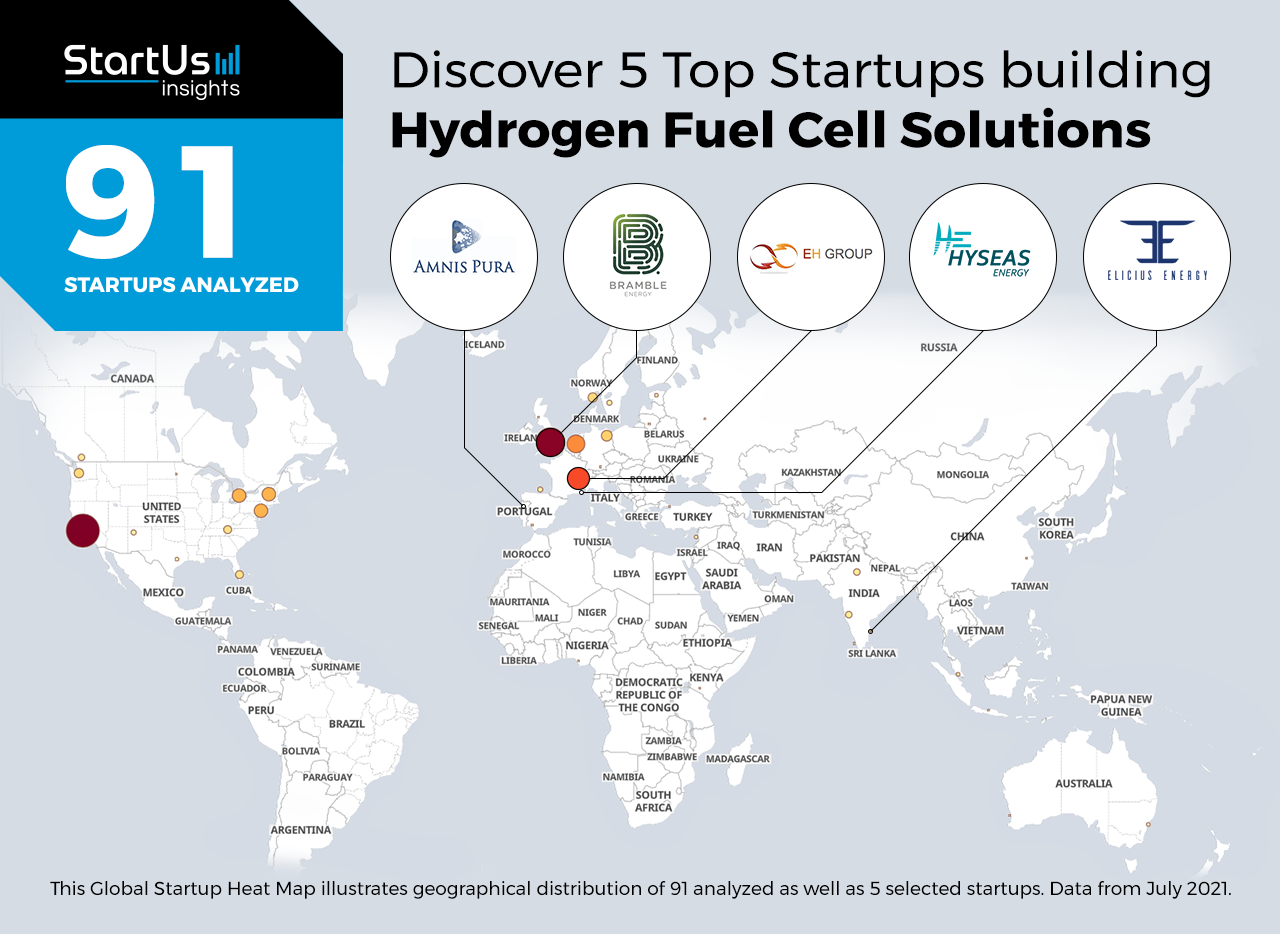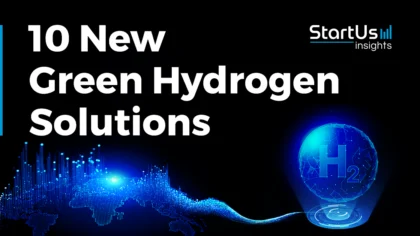Staying ahead of the technology curve means strengthening your competitive advantage. That is why we give you data-driven innovation insights into the hydrogen industry. This time, you get to discover 5 hand-picked startups developing hydrogen fuel cell solutions.
Global Startup Heat Map highlights 5 Top Hydrogen Fuel Cell Solutions out of 91
The insights of this data-driven analysis are derived from the Big Data & Artificial Intelligence-powered StartUs Insights Discovery Platform, covering 2.093.000+ startups & scaleups globally. The platform gives you an exhaustive overview of emerging technologies & relevant startups within a specific field in just a few clicks.
The Global Startup Heat Map below reveals the distribution of the 91 exemplary startups & scaleups we analyzed for this research. Further, it highlights 5 energy startups that we hand-picked based on criteria such as founding year, location, funding raised, and more. You get to explore the solutions of these 5 startups & scaleups in this report. For insights on the other 86 hydrogen fuel cell solutions, get in touch.
EH Group develops High-Performance Hydrogen Fuel Cell Technology
Hydrogen fuel cells are a safe, dependable, and efficient source of electricity. They use hydrogen as a fuel to drive an electrochemical process that generates energy, with the only by-products being water and heat. Emerging startups and scaleups seize the associated economical and environmental benefits of hydrogen energy, and put it in use for industrial applications.
EH Group (EHG) is a Swiss company that designs high-performance hydrogen fuel cell technology. The startup offers technical services in the area of energy with a focus on fuel cells, system management, engineering, prototype development, and the application of various methodologies such as Design for Six Sigma (DFSS) and Design for Excellence (DfX). EHG’s fuel cells are compact, lightweight, and have high system efficiency. In addition, its fuel cells have both mobile and stationary options.
Amnis Pura develops Proton-Exchange Membrane (PEM) Fuel Cells
A hydrogen fuel cell produces electricity using the chemical energy of hydrogen in a clean and efficient manner. Further, hydrogen is easily storable, light, as well as energy-dense and produces no direct pollutant. Hence, startups work towards making hydrogen part of the clean energy future. To this end, emerging companies develop proton-exchange membrane fuel cells (PEMFCs) that use hydrogen and oxygen as fuel for commercial applications.
Amnis Pura is a Portuguese startup that develops hydrogen technologies including PEM fuel cells for commercial applications. Its pressure swing absorption (PSA) units combine an innovative adsorbent with an optimized cycle, allowing the company to obtain fuel cell-grade hydrogen. The startup’s PEM fuel cells meet the requirements for transport and stationary applications. Furthermore, the startup develops bipolar plates for polymer electrolyte membrane fuel cells using a fully automated manufacturing process that includes high-precision tools.
Elicius Energy offers Tubular Fuel Cells
Fuel cells have many advantages over traditional combustion-based technologies, which are being employed in a number of power plants and vehicles. In particular, fuel cells have the capacity to function at higher efficiencies compared to combustion engines, transforming chemical energy in fuel straight to electrical energy with higher conversion efficiencies.
Elicius Energy is an Indian startup that develops energy storage technologies designed to hold clean and increased power. The company’s technology provides a tubular PEM Fuel Cell stack with faster processing time and lower equipment costs for fuel cell and battery management systems. This enables users to have lightweight, simple equipment suitable for onboard and online applications in a cost-efficient manner.
Bramble Energy manufactures Hydrogen Fuel Cells using Printed Circuit Boards (PCB)
Climate change is the paramount global concern, thus countries pledge to lower their carbon emissions in the years to come. However, fossil fuels are still an integral part of society and the global economy nowadays, from the cars people drive to the electricity that heats urban houses. To address this issue, green startups working towards renewable energy see hydrogen as a key tool for decarbonization.
Bramble Energy is a British startup and an innovator in renewable energy technologies. The startup manufactures fuel cell stacks using printed circuit board materials and processes. Its product PCBFC™ utilizes cost-effective production methods and materials from the PCB industry to reduce the cost and complexity of manufacturing hydrogen fuel cells. Further, the PCBFC is flexible in design and therefore can be manufactured into any shape within the PCB panelized footprint. This means that the PCBFC is capable of taking a variety of form factors, such as the wing of a UAV or the frame of a bicycle.
Hyseas Energy develops Maritime Hydrogen & Fuel Cell Technology
According to the International Maritime Organization’s (IMO’s) fourth greenhouse gas study, the total emission from the shipping industry grew by 10% from 2012 to 2018. As a result, the organization aims to reduce emissions from shipping by half in the coming decades, by adopting CleanTech. Because hydrogen is an abundant element locked up in water, hydrocarbons, and other organic matters, hydrogen fuel cells are one of the most promising technologies for achieving the maritime industry’s target.
Hyseas Energy is a French startup that provides marine-grade, clean power solutions based on hydrogen fuel cell systems. The startup uses existing mature and proven H2 technologies to adapt and package them into complete power systems for maritime applications. Its power solutions are scalable from small to large power applications and their maintenance does not generate toxic waste. Furthermore, the startup’s main product Hydrogen Marine Genset is fully certified to the relevant marine regulations.
Discover more Energy Startups
Energy startups such as the examples highlighted in this report focus on Demand Side Management, Distributed Energy Resources, Quantum Computing as well as Energy Storage. While all of these technologies play a major role in advancing the energy industry, they only represent the tip of the iceberg. To explore more energy technologies, simply get in touch to let us look into your areas of interest. For a more general overview, you can download our free Energy Innovation Report to save your time and improve strategic decision-making.









